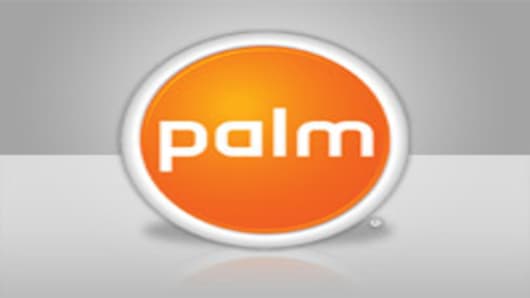Palm
will release its quarterly earnings Thursday, and this report is arguably the most important in the company's recent history. This stock has been on a wild ride since January, and investors will learn whether they're aboard a rocket to the moon, or a nuclear missile ready to explode.
The Street anticipates a loss of 64 cents on $79 million in revenue for Palm's fourth fiscal quarter. Nope, that's not a misprint. Those are the actual numbers. Deep red ink on paltry revenue, and yet this stock is up something like 1,100 percent since the January unveiling of the Palm Pre. And you thought the iPhone was the "Jesus" phone.
Look, I'm not blasting Palm for being a bad company, or a poor investment. I think the company has done great work getting the Palm Pre out the door, and sales seem to be going swimmingly. In fact, RBC's wireless analyst Mike Abramsky (who deserves a victory lap for his early "buy" call on Palm months ago) estimates that carrier partner Sprint has sold 150,000 Pre's to date, above his prior forecast of 120,000 units. Impressive numbers to be sure.
A current RBC/Changewave survey of 4,100 respondents shows Palm buying intentions doubling from 4 percent to 8 percent, with Pre inventories remaining low, Sprint stores sold out, and dealing with daily replenishment, his note says. Sure, sell-outs and restocking is a nice problem to have, but not being able to meet demand is a big problem nonetheless.
He goes on to say that the trend is only just the beginning: He's raising his fiscal 2010 and 2011 shipment estimates from 3.2 million and 4.6 million to 4.1 million and 6.5 million respectively. For the company's first quarter, he's taking his estimate from 470,000 units to 550,000 units.
Couple all that with Verizon on deck to offer the Pre in about five months, and other vendors including AT&T that may offer handsets running Palm's WebOS software, and there's enough catalysts for Abramsky to raise his target from $14 a share to $18.
All of that optimism comes even in the wake of news from Apple this week that the company managed to sell 1 million iPhone 3GS's in its debut weekend with another 6 million iPhone users downloading the new 3.0 operating system (indicating that they're not planning on trading in their iPhones any time soon.) Additionally, I saw that 12 percent of Blackberry owners apparently traded their handsets in for the new iPhone. And speaking of Research in Motion , the company in its most recent earnings report said it had sold nearly 8 million Blackberrys in the prior quarter.
- Slideshow: Evolution of Wireless Communication
I have written a number of times that the smart phone sector is clearly robust enough to support multiple big winners. More than a billion handsets will sell this year, and only 12 percent of them are so-called "smart phones," meaning the market opportunity for companies like Apple, RIM, Nokia and even Palm, are still enormous.
But on a percentage basis, Palm -- even with the success of Pre -- is still an also-ran, way back in the rear view mirrors of RIM and Apple. It is certainly doing better than it has, and I think there are rosy times ahead for this company, its technology and its shareholders. I'm just suggesting that perhaps exuberance has replaced rationality and shares have taken off far faster than Palm's financial performance warrants.
Was Palm unfairly valued at $3 and change in January? Not really. The company was in dire financial straits, its cash was in terribly short supply, its technology wasn't being received well in the marketplace. It bet the farm on Pre, and that's apparently been a good bet indeed. These shares deserved to rally. But like this? This much? This quickly?
Credit Suisse seems to think so. The firm raised pro forma revenue and EPS for fiscal 2011 from 64 cents a share on $2.2 billion to $1.06 a share on $2.9 billion in revenue. The firm is also taking its target from $11 a share to $18. All of this thanks to "heightened carrier interest, our updated margin analysis, and increased confidence" in the WebOS software.
So much excitement about this rocket ship ride, and no one seems to be questioning the astronomical price-to-earnings ratio these shares are commanding. At the same time, just for comparison, Apple has real sales, enormous profits, steadily high margins, a far, far, far more diversified product line, better than $30 billion in cash in the bank and its considered "too pricey" with a p/e of about 22x next year's earnings. I get the difference, that Palm's perceived growth potential from nothing to something might be more appealing than 10, 15, even 30 or 40 percent growth that Apple might offer. But if you take into consideration track record of execution and cash, and success in the marketplace, Apple might offer the better, more stable investment option.
Still, I don't want to take anything away from Palm's success. CEO Jon Rubinstein, and his predecessor Ed Colligan did a fine job getting Pre to market, but you gotta figure that success is more than baked into shares. And short of some enormous upside surprise Thursday, you wonder whether Palm can keep this up. We can revisit when Palm gets a lot closer to turning red into black and the company has more to offer than a one-hit-wonder for investors.
Questions? Comments? TechCheck@cnbc.com


